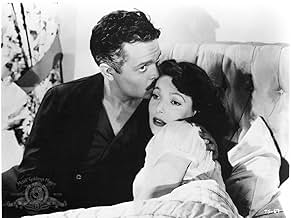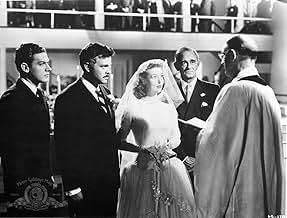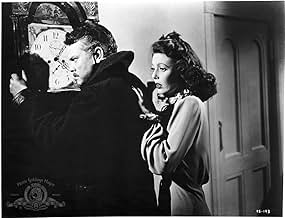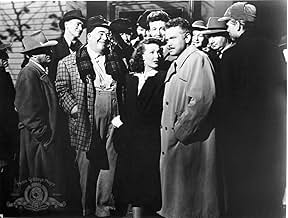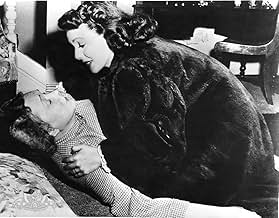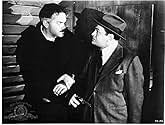IMDb RATING
7.3/10
30K
YOUR RATING
An investigator from the War Crimes Commission travels to Connecticut to find an infamous Nazi.An investigator from the War Crimes Commission travels to Connecticut to find an infamous Nazi.An investigator from the War Crimes Commission travels to Connecticut to find an infamous Nazi.
- Nominated for 1 Oscar
- 2 nominations total
David Bond
- Student
- (uncredited)
John Brown
- Passport Photographer
- (uncredited)
Nancy Evans
- Undetermined Role
- (uncredited)
Adolph Faylauer
- War Crimes Commision Member
- (uncredited)
Fred Godoy
- Undetermined Role
- (uncredited)
Theodore Gottlieb
- Fairbright
- (uncredited)
Joseph Granby
- Undetermined Role
- (uncredited)
Ethan Laidlaw
- Todd
- (uncredited)
Featured reviews
Who says that fear of terrorism is a new development, post 9/11. Imagine the fears and exposed nerve endings of the average towns person living in the shadow of World War II. There was the fear of infiltration by the Nazis with their secret agents, blending in with our everyday citizens. Orson Welles plays just such a guy. He is kind, pleasant, quiet, and very dangerous. He even sets about marrying a woman as part of his secret plot. Edward G. Robinson, who normally would have been the heavy, plays a tired, hard working investigator who is leaving no stone unturned. The plot is intricate, though predictable, and the whole thing is hard to take your eyes off. Welles was a great director, but perhaps an even better actor. He keeps this thing going, raising it above the common fair of the time. The writing keeps the good guys at bay, but the clues continue to sit there, ripe for discovery. The clock tower is a great symbol, continuing to remind us of the urgency of everything. The dramatic irony presented makes us continually uncomfortable. We are treated to the movements and activities of the villain, and being let in, it makes everything more enjoyable. See this if you can.
A little much in parts, particularly the use of headlight direction that Welles loves to employ, nevertheless, this is a film that rates three stars in the Wellesian collection.
Edward G. Robinson is superb as the laid-back, all-knowing, in-your-face detective and Loretta Young scores as Orson's wife but it's big Billy House who is the real scene-stealer. House plays the man who owns the self-service store in town who likes playing checkers with his customers.
Welles, who looks a little strange--no doubt to match up with the title-provides a commanding performance throughout in a film that reflects the era's revulsion with the Nazi dream.
Edward G. Robinson is superb as the laid-back, all-knowing, in-your-face detective and Loretta Young scores as Orson's wife but it's big Billy House who is the real scene-stealer. House plays the man who owns the self-service store in town who likes playing checkers with his customers.
Welles, who looks a little strange--no doubt to match up with the title-provides a commanding performance throughout in a film that reflects the era's revulsion with the Nazi dream.
Stylish noir trading on public's concern with escaped Nazis following WWII. First part is especially intriguing since we can't be sure what's happening or who Franz Kindler is. The atmosphere is typically Wellesian— shadows galore, imaginative camera set-ups, along with dramatic use of sound. Two features, however, standout for me.
Once the plot comes into focus, we know Kindler (Welles) must do away with Meinicke (Shayne), but how. The forest scene is inspired, more menacing I think than the finale. The two men are on bended knee, in apparent communion with the forces of good, except one of them is not.
Second is Welles' depiction of small town America through druggist Potter (House, in a splendid performance). Grossly over-weight, he sits all day in front of his checkerboard, hoping to entice some sucker into a game, so he can cheat them out of a quarter. Worse, he makes customers serve themselves, apparently so he won't have to move his bulk. Not exactly the neighborly small town of Shadow of a Doubt (1943), for example.
Given the movie's many arresting features, I'm not sure why its profile isn't higher among both noirs and the Welles canon. My best guess concerns a general absence of ambiguity among both characters and situations. Instead, the screenplay is a straight pursuit film of good vs. evil that makes good use of cat and mouse, and of atmosphere, but is unexceptional in storyline. So if you're looking for stylish suspense without tricky moral complications, this is a movie to catch.
Once the plot comes into focus, we know Kindler (Welles) must do away with Meinicke (Shayne), but how. The forest scene is inspired, more menacing I think than the finale. The two men are on bended knee, in apparent communion with the forces of good, except one of them is not.
Second is Welles' depiction of small town America through druggist Potter (House, in a splendid performance). Grossly over-weight, he sits all day in front of his checkerboard, hoping to entice some sucker into a game, so he can cheat them out of a quarter. Worse, he makes customers serve themselves, apparently so he won't have to move his bulk. Not exactly the neighborly small town of Shadow of a Doubt (1943), for example.
Given the movie's many arresting features, I'm not sure why its profile isn't higher among both noirs and the Welles canon. My best guess concerns a general absence of ambiguity among both characters and situations. Instead, the screenplay is a straight pursuit film of good vs. evil that makes good use of cat and mouse, and of atmosphere, but is unexceptional in storyline. So if you're looking for stylish suspense without tricky moral complications, this is a movie to catch.
The IMDb trivia page says this is Orson Welles's least favorite and least personal film. Aside from "Citizen Kane" and "The Magnificent Ambersons," I think this potent film noir is his most enjoyable—certainly more so than the ugly "Lady from Shanghai" or the overbaked and convoluted "Touch of Evil."
Charles Rankin (Orson Welles) is a professor in a respectable Connecticut town about to marry the daughter of a U.S. Supreme Court justice. But his name is fake and his past is filthy. An earnest convert to Christianity (Konstantin Shayne), who once ran a Nazi concentration camp, is capable of exposing him. "Rankin" kills this little old man and buries his body in the forest. But he isn't safe because an investigator (Edward G. Robinson) from the War Crimes Commission is on his tail. Rankin needs his own wife (Loretta Young) to help him elude capture. But his fascination with the local clock tower may prove his undoing.
As a director, Welles strains a bit too hard for effect in this film—and much too hard in everything but "Kane" and "Ambersons." In those two films all of his technical effects, striking as they are, seem effortless and exactly the right choices. Here, he has imperfect moments—such as the scene where his character is frantically, and inexplicably, trying to pick up pieces of paper—but everything else is splendid, especially the climax.
As an actor he's always compelling, but I think he makes one bad choice here. He's too guilty-looking in the early scenes. It makes us wonder why no one suspects him; and it robs us of a dramatic contrast when he begins to realize he's in imminent danger.
Loretta Young is generally a dull actress. She doesn't have enough skill to make an impression in the early scenes; but once the part requires histrionics she performs her duties well enough. Certainly her character is morally dubious and therefore fascinating in itself.
The best performance by far is Edward G. Robinson's. One of the great actors of his time, this ugly man has enough talent and star quality to underplay his role to great effect.
Orson Welles fans might find this exciting, well-plotted thriller too un-Wellesian to suit them. Otherwise, this is highly recommended.
Charles Rankin (Orson Welles) is a professor in a respectable Connecticut town about to marry the daughter of a U.S. Supreme Court justice. But his name is fake and his past is filthy. An earnest convert to Christianity (Konstantin Shayne), who once ran a Nazi concentration camp, is capable of exposing him. "Rankin" kills this little old man and buries his body in the forest. But he isn't safe because an investigator (Edward G. Robinson) from the War Crimes Commission is on his tail. Rankin needs his own wife (Loretta Young) to help him elude capture. But his fascination with the local clock tower may prove his undoing.
As a director, Welles strains a bit too hard for effect in this film—and much too hard in everything but "Kane" and "Ambersons." In those two films all of his technical effects, striking as they are, seem effortless and exactly the right choices. Here, he has imperfect moments—such as the scene where his character is frantically, and inexplicably, trying to pick up pieces of paper—but everything else is splendid, especially the climax.
As an actor he's always compelling, but I think he makes one bad choice here. He's too guilty-looking in the early scenes. It makes us wonder why no one suspects him; and it robs us of a dramatic contrast when he begins to realize he's in imminent danger.
Loretta Young is generally a dull actress. She doesn't have enough skill to make an impression in the early scenes; but once the part requires histrionics she performs her duties well enough. Certainly her character is morally dubious and therefore fascinating in itself.
The best performance by far is Edward G. Robinson's. One of the great actors of his time, this ugly man has enough talent and star quality to underplay his role to great effect.
Orson Welles fans might find this exciting, well-plotted thriller too un-Wellesian to suit them. Otherwise, this is highly recommended.
This film has been knocked by many people saying that Orson Welles was forced to work within the strict confines of the Hollywood system. I have absolutely no problem with this. Welles is a master craftsman. He made great films, period. In an interview he said that the studio cut out " a couple of reels" that take place in South America at the beginning of the story that he felt was the best part of the movie. As a viewer I feel that the film is compact and taut. Adding more to it would not help(in my opinion). On the contrary, I think adding more might make the film sluggish. As it stands the film remains dark. You feel that evil is present. You are just not sure what is going to happen next.
The performances in this film are for the most part excellent. Edward G. Robinson is amazing. This could have been a cardboard thin good-guy part. Instead he turns the character of Wilson into a smart, cunning hero. He is self-assured not obsessed. He understands what most people in the town don't: Kindler is a monster who is capable of anything. To catch such a man you have to be several steps ahead of him. Also excellent is Konstantin Shayne as Meinike. You can see the fear and madness in his eyes as he repeats "I am travelling for my health, I am travelling for my health..." before going through customs. Make no mistake, this man is "an obscenity that must be destroyed" to quote Wilson. Just look at his scene with the photographer in South America. He is used to people following his orders. Welles is also very good as Kindler/Rankin. There are moments that you actually feel sympathy for him. His obsession with fixing the town clock is very significant. Here is a man who needs things to be precise and structured. He wants total control of his environment(a good example is how he treats his wife). Welles hints at this man's mania but keeps him human. Even though you want him to be caught, you can't help wondering if he'll get away. Loretta Young is unfortunately just average in this film. She has some good moments (especially in the final scene when she confronts Rankin/Kindler)but her hysterics are just too much. The scene where Wilson is showing her the Nazi atrocities is well played. She keeps a certain composure that works well.
Overall, a very well made thriller with top notch performances and solid direction by one of cinema's masters. I give it 8 clock towers out of 10.
The performances in this film are for the most part excellent. Edward G. Robinson is amazing. This could have been a cardboard thin good-guy part. Instead he turns the character of Wilson into a smart, cunning hero. He is self-assured not obsessed. He understands what most people in the town don't: Kindler is a monster who is capable of anything. To catch such a man you have to be several steps ahead of him. Also excellent is Konstantin Shayne as Meinike. You can see the fear and madness in his eyes as he repeats "I am travelling for my health, I am travelling for my health..." before going through customs. Make no mistake, this man is "an obscenity that must be destroyed" to quote Wilson. Just look at his scene with the photographer in South America. He is used to people following his orders. Welles is also very good as Kindler/Rankin. There are moments that you actually feel sympathy for him. His obsession with fixing the town clock is very significant. Here is a man who needs things to be precise and structured. He wants total control of his environment(a good example is how he treats his wife). Welles hints at this man's mania but keeps him human. Even though you want him to be caught, you can't help wondering if he'll get away. Loretta Young is unfortunately just average in this film. She has some good moments (especially in the final scene when she confronts Rankin/Kindler)but her hysterics are just too much. The scene where Wilson is showing her the Nazi atrocities is well played. She keeps a certain composure that works well.
Overall, a very well made thriller with top notch performances and solid direction by one of cinema's masters. I give it 8 clock towers out of 10.
Did you know
- TriviaThis was the first mainstream American movie to feature footage of Nazi concentration camps following World War II.
- GoofsTwo palm trees are visible in the first scene depicting the fictional Connecticut town.
- Quotes
Mr. Wilson: Well, who but a Nazi would deny that Karl Marx was a German because he was a Jew?
- Alternate versionsAlso available in a computer-colorized version.
- ConnectionsEdited into Ninja the Mission Force: Citizen Ninja (2012)
Details
Box office
- Budget
- $1,034,000 (estimated)
- Runtime
- 1h 35m(95 min)
- Color
- Aspect ratio
- 1.37 : 1
Contribute to this page
Suggest an edit or add missing content



